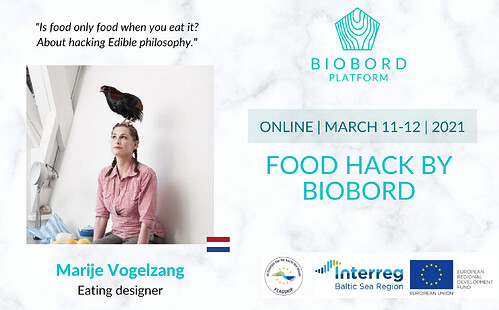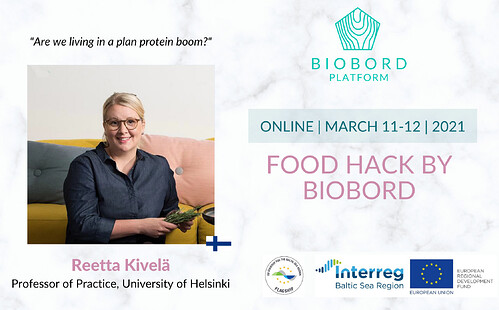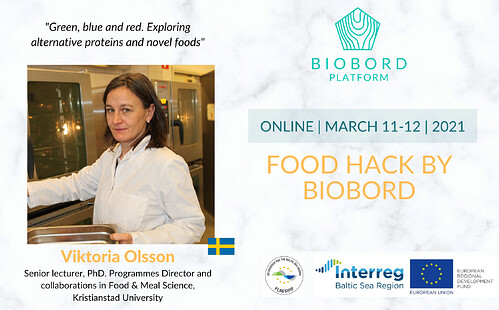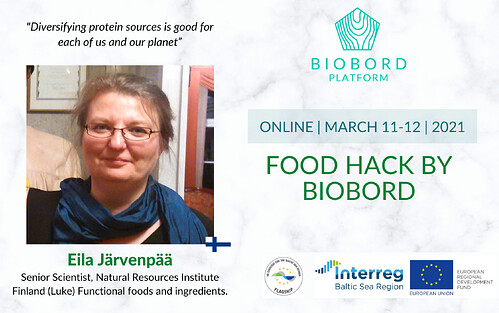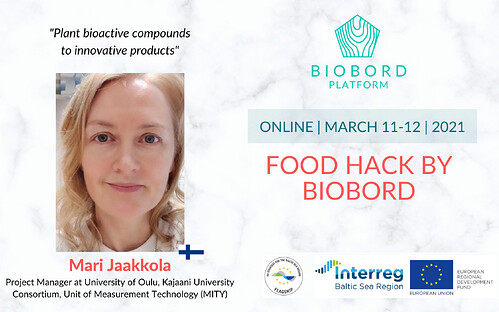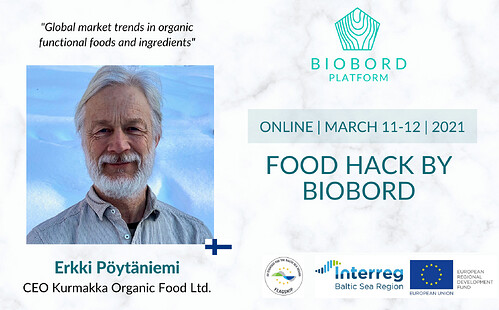Challenges are out!
Food Hack by Biobord is a digital 24-hour long innovation competition hosted by the Interreg Baltic Sea Region project ConnectedbyBiobord , with a transnational team of experts and hackers. The ConnectedbyBiobord -project is working for building competitive transnational collaboration in unlocking new market opportunities within the bioeconomy field in the Baltic Sea Region. The theme of the competition is ” Alternative proteins and functional foods ” and we have collected five challenges that are common for companies in the Baltic Sea region.
Functional foods: foods containing probiotics, prebiotics, or plant stanols and sterols. Functional foods, drinks, and ingredients that deliver additional or enhanced benefits over and above their basic nutritional value. They can also be fortified food products with a nutrient that would not usually be present to any great extent, like specific vitamins.
Alternative proteins: Alternative protein sources encompass variety of meat substitutes, including algae, mycoprotein, plant-based legumes and insects.
Food Hack by Biobord is an event where open innovation and the idea of everyone growing whilst sharing knowledge is core (if you do not want to share something – do not tell!). This means that everyone can claim the ideas or solutions that come up during the event and that everything you share with others will help to fulfill this purpose.
Would you like to be a hacker?
As a hacker you will work in teams with challenges, boosted by the latest research and experienced mentors. All in the spirit of open challenge driven innovation! You will be part of a team based on what challenge you are most interested in. The challenges are presented below. As a hacker you are part of the full program including inspiration sessions, meetings with experts in the field and taking part in the innovation competition. The program will be from Thursday, March 11th morning until Friday, March 12th afternoon. More detailed schedule will be sent to registered hackers at the end of February, together with additional information. Winning team of the Food Hack by Biobord will move on to a second innovation round and is able to develop their challenge-driven innovation even further with new experts and support. All participants leave the event with new transnational contacts and new knowledge, and who knows – with new innovations!
Make sure to register each participating member of your organization to this free event before 21.02.2021:
https://link.webropolsurveys.com/S/999A853B6B846E35
Challenges
Nowadays our food system is facing multiple challenges, including decreasing availability of natural resources and the co-existence of hunger and obesity issues. Such complex problems require that diets and food production move towards a more sustainable direction: how can food companies contribute to this goal? In this Food Hack, various challenges will be used to promote cooperation among companies and to tackle the existing problems of our food system.
One of the possible solutions can be the development of new products with alternative protein sources or functional food. In order to bring the new products from the first idea to a finished product on the market, often with limited resources, we need to collaborate and network.
We have to create a sustainable way of working long-term and sharing experiences and knowledge with each other. Working this way, we can speed up processes, learn from mistakes, create a consumer demand together and cut lead times. The objective is to bring our new high-quality products to the market faster and more successfully.
The exchange of technical expertise and creative ideas for marketing communication is a success factor for the future. All proposed challenges below can be seen as starting points for discussions regarding how to collaborate on common issues, obstacles, and possibilities, and how to benefit from each other’s knowledge and experience.
Please select the top 3 challenges of your choice in the order of preference. The actual selection is done in the online registration form.
How to share and exchange expertise knowledge
Components of herbal plants and fungi are used as ingredients in the production of various fermented products. Companies are developing new malt-based fermented drinks, supplemented with plant and fungi based bioactive compounds to achieve various qualities for nutrition, energy boosting and health benefits. Bioactive compounds are extracted from plants and fungi, and the challenge is to maintain the nutritional value of these compounds and at the same time obtain products with taste quality that can be accepted by and appealing to consumers. This requires technical expertise – a knowledge that several companies could share.
Challenge: How can various stakeholders working on similar challenges share their knowledge and expertise in a creative and constructive way? What do the channels of information look like today and how can we improve them? In what way can we gain access to process and technology know-how? Today and in the future?
Finding new and different strategies for marketing healthy and nutritious food
In order to increase production volumes to make niche products more attractive and affordable, companies dealing with food innovation in the fields of plant-based proteins, functional ingredients and novel food sources often face significant challenges. These range from understanding what customers are exactly looking for in plant-based products and functional food, to assessing the impact of ingredients and production processes on the product microstructure and texture, to proving the claimed benefits of healthiness and nutrition, and to increasing the willingness of consumers to invest into sustainable future
by starting to use alternative protein sources.
Today, marketing is all about finding your niche and building the platform where your voice will make a difference and can be heard. As it can be difficult for any SME, micro or start up business to enter and be a profitable player in any market, main or niche, companies need to be innovative to find, develop and be successful in their market of choice.
Challenge: What kind of marketing strategies (e.g., nudge marketing to influence customers’ decisions indirectly through suggestion and reinforcement ) can be used to increase the consumption of healthier and more innovative food products that are beneficial, attractive, and affordable, thus more sustainable for the planet, businesses, and the individual? Can technical solutions enhance the consumption of sustainable and healthy foods?
Changing the perception of plant-based proteins
Plant-based foods are usually a more environmentally friendly option than foods containing meat: for this reason, more attention should be placed on plant-based proteins. Developing new plant-based products can be quite difficult for small businesses, as a lot of research and testing needs to be done to find mutually supportive ingredients in terms of taste, texture, nutrients, and appearance. In the product development of plant-based/alternative protein sources the aim is often to produce foods that are ‘instead of meat’ or ‘equal to meat’. Neither product development nor the marketing of these products is particularly successful.
Plant-based and alternative protein products could instead be seen as a separate food category with their own interesting qualities and characteristics. Products can often be heavily processed and contain many additives to make them more familiar or meat-like to consumers. It is in the interest of food producers, and even a market demand, to develop less processed foods, and also use local ingredients instead of X (X = coconut oil, sugar, glucose syrup and invert sugar solution or similar).
Innovation has focused on appealing to meat eaters’ presumed demands – but moving from eating meat to eating food with other protein sources is a bigger step if these products are perceived as artificial and heavily processed.
Challenge: Instead of modifying the structure of the product, what strategies can be built to change our perception of plant-based proteins as a direct alternative to animal proteins in a particular familiar dish (e.g., sausage, hamburger). How can we instead see these new products as stand-alone products with plant-based protein sources? What would we call these products and how would they be marketed?
- Transforming the attitude towards new products including protein from insects and insects as food.
For several years, insects have been considered as part of a future, sustainable diet, and a strong candidate among alternative proteins. Countries have different regulations and laws regarding insects as food for humans, and this has led to differences in the speed and amount of development around this theme in the Baltic Sea region. In some countries the only way to sell insects as human food is to sell them as whole insects, since a fragmentation into pure protein is not allowed. Despite companies’ extensive efforts to extract human food from insects, they have faced a tough challenge due to the above mentioned and cultural constraints and resistance, which has resulted in failure to reach a commercial market.
Various cooking methods and recipes have been explored to make these novel foods accepted by the public. Instead of focusing on the process and texture it is time to explore how the context and culture can have an impact on how we perceive insects as food.
Challenge: What would happen if we place the insect food product in a different context (environment, tradition, or culture)? How do we design the ‘insect food experience’ to attract new markets? What marketing strategies can be explored to design the insect food experience? In which context, tradition or culture could the insect fit in?
Exploration of new protein sources
Protein rich legumes, for example beans and peas, and their side streams are used in the development of new protein rich products. Today companies produce or process these legumes but as in the case of beans and peas, they are mainly used for protein extrusion or production of other end products such as salted bean snacks.
Three main needs can be identified:
Identification of new raw materials which could be used themselves as ingredients either pure or in combination with other products.
Exploration of new products where side streams would be used. A challenge can be the special taste of legume side streams, which makes it difficult to use in place of products of for example cereal origin.
Economically feasible solutions needed for small and medium-sized production systems to create dynamic, agile, and thus radical innovation.
Challenge: What could be new sources for protein and how to spread knowledge about them? What are the possibilities to use new plant-based proteins’ side streams? How to find economically feasible solutions for small and medium-sized production?
Practical information
Food Hack by Biobord teams will be formed as transnational teams, based on the participants’ challenge preferences. Composition of the teams will be announced at the start of the virtual hackathon event and teams will have 24h to hack the challenge of their choice, supported by experts in relevant fields. Experts will be selected according to the challenges, so the best possible help is at your disposal. Experts will be presented to the teams in the information package that is sent to all participants by the end of February/beginning of March. Teams will also have technical support and general guidance available during the day, from 08:00 – 17:00. An online meeting platform and co-working tools are also provided for the teams by the project coordinators, so hacking is possible even after office hours. All details will be specified in the information package.
For now, we are kindly asking you to:
- Select top 3 challenges you are most interested in
- Register (all participants from your organizations) and announce your 3 choices
- Save the date 11.03. – 12.03.2021 (from 09:00 – 16:00 (EET))
- Stay tuned for more details
In case of questions, do not hesitate to contact us:
Riikka Kumpulainen, project manager of ConnectedByBiobord @riikkakumpulainen
riikka.kumpulainen@jamk.fi/ +358 505759454
Elin Hansson, event coordinator and project partner @elin_hansson
elin.h@krinova.se / +46 738082061



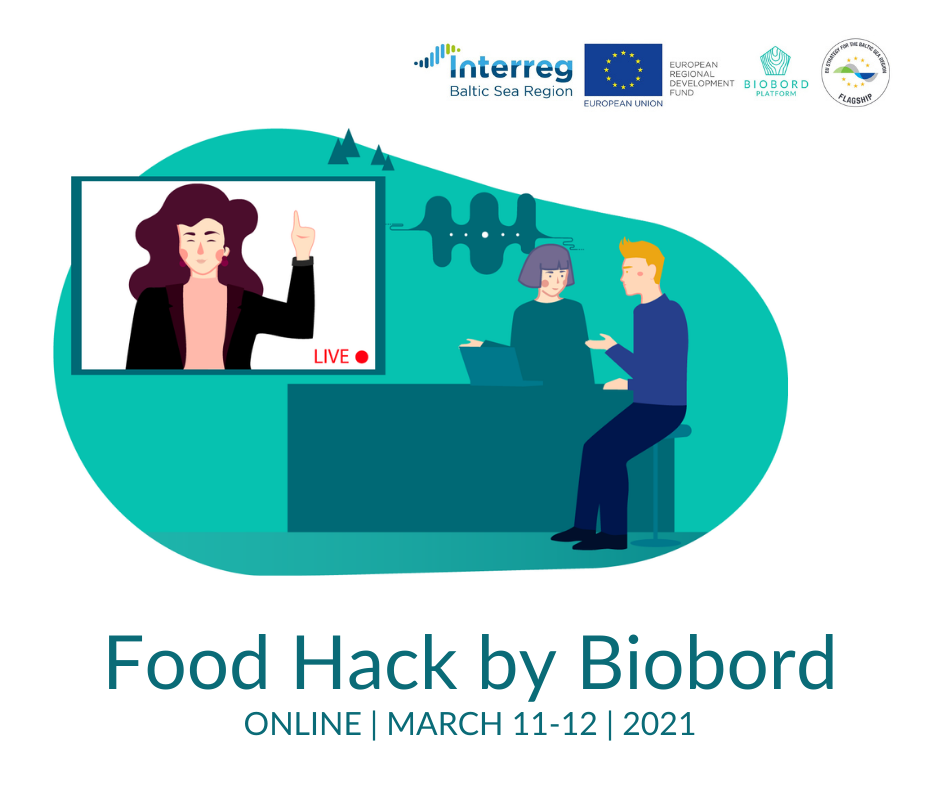

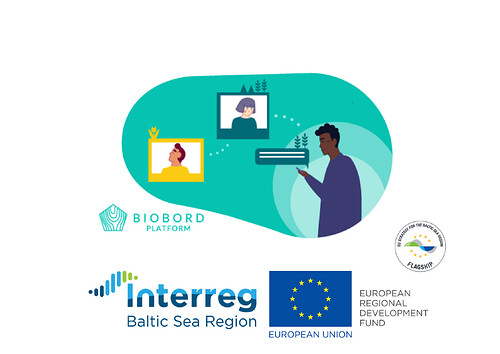

 Can we also join as viewers?
Can we also join as viewers? 

